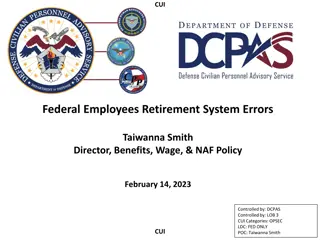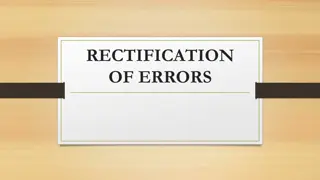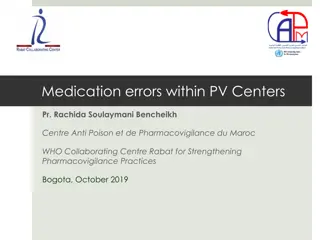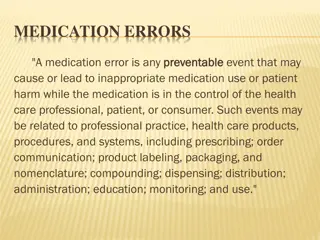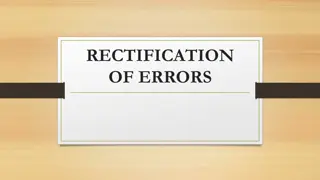Understanding Human Factors in Medical Errors
In a video discussing medical errors, it was highlighted that 100,000 to 200,000 people die annually due to medical errors in the USA. Causes were attributed to system failures, not just healthcare provider errors. Examples included a surgeon removing a healthy kidney instead of a diseased one and a trainee surgeon saving a baby during an operation when a senior surgeon hesitated. Effective communication, both verbal and non-verbal, was emphasized as crucial in preventing such errors.
Download Presentation

Please find below an Image/Link to download the presentation.
The content on the website is provided AS IS for your information and personal use only. It may not be sold, licensed, or shared on other websites without obtaining consent from the author. Download presentation by click this link. If you encounter any issues during the download, it is possible that the publisher has removed the file from their server.
E N D
Presentation Transcript
HUMAN FACTOR Group 1
Group :A1 Abdulkarim Alharbi Abdulrahman Thekry Ahmed Bages Nawaf Alzhrani Hussam Almutari Ahmed bages Majed alzhrani Group leader : ziad alanazi
Title of the video : Why Medical Error Link of the video : https://youtu.be/u6VuaxC0m5I
Summary of the video He talked about medical error and how is the 5th or 6th leading death in the USA between 100,000 and 200,000 a year that is equivalent to 30 jumbo airplane crashed in us and UK and Australia combined. He mentioned some causes about the medical error and how sometime the system is the issue that medical healthcare provider do mistakes. He gives an example and said if we took 300 of you, 20 or 30 will be injured, 5 or 6 will be seriously injured and 1 will die People think only bad doctors make mistakes and that is wrong because everyone can make mistakes. One drug vincristine is a chemotherapy if given I.V will cure you and if you give it into the spine it will kill you it got 100% mortality.
scenario one scenario he mentions is a surgeon instated of taking a diseased kidney he took out a healthy kidney and one medical student told him about the mistake but he refuse to listen to him and continue performing the operation.
scenario another scenario is he went to see an operation done on a baby. after 45 minutes the baby was bleeding to death because the trainee surgeon has nicked a vessel and it was the aorta and there was no senior doctor and no senior surgeon they but came very quickly and the trainee ask support from the senior surgeon to do the right thing but the senior want to be in control so he said that is the wrong thing and I will sort it up myself but the trainee realised how sick is the baby and did the decision that saved the baby which was a brave thing to do
Human factors Communication Human-machine interaction
Good communication Being able to communicate effectively is the most important of all life skills. 1-Listening: Listening is a vital interpersonal communication skill. At this video , it was clear they have poor communication . doctor didn t listen to the medical student when he said (I think you are taking the wrong kidney ) 2-Non-verbal Communication We actually communicate far more information using Non-verbal Communication. This includes non-verbal signals, gestures, facial expression, body language, tone of voice, and even our appearance.
Human-machine interactions: Human-machine interactions: Advanced technologies used in health care have increased the relevance of human factors in errors because the potential for harm is great, when technology and health-care devices are mishandled. As we see in the video two examples of poor human-equipment interface: 1: In first example we see two different infusion pumps one of them the buttons start at top from seven,eight and nine, and the another one the buttons start at top from one, two and three. 2:In second example the main function button of the anaesthetic machine is next to the on/off button. We need to designe and organize the workplace to minimize the likelihood and the impact of errors.
This picture of the second example: anaesthetic machine This Picture of the first example: Infusion pumps
summary Even good doctors do mistakes. Team work, trusting team members and good communication is essential. The brain has a black holes and it can trick you!. Equipment design can prevent a lot of medical errors. Briefing and debriefing is really important.


